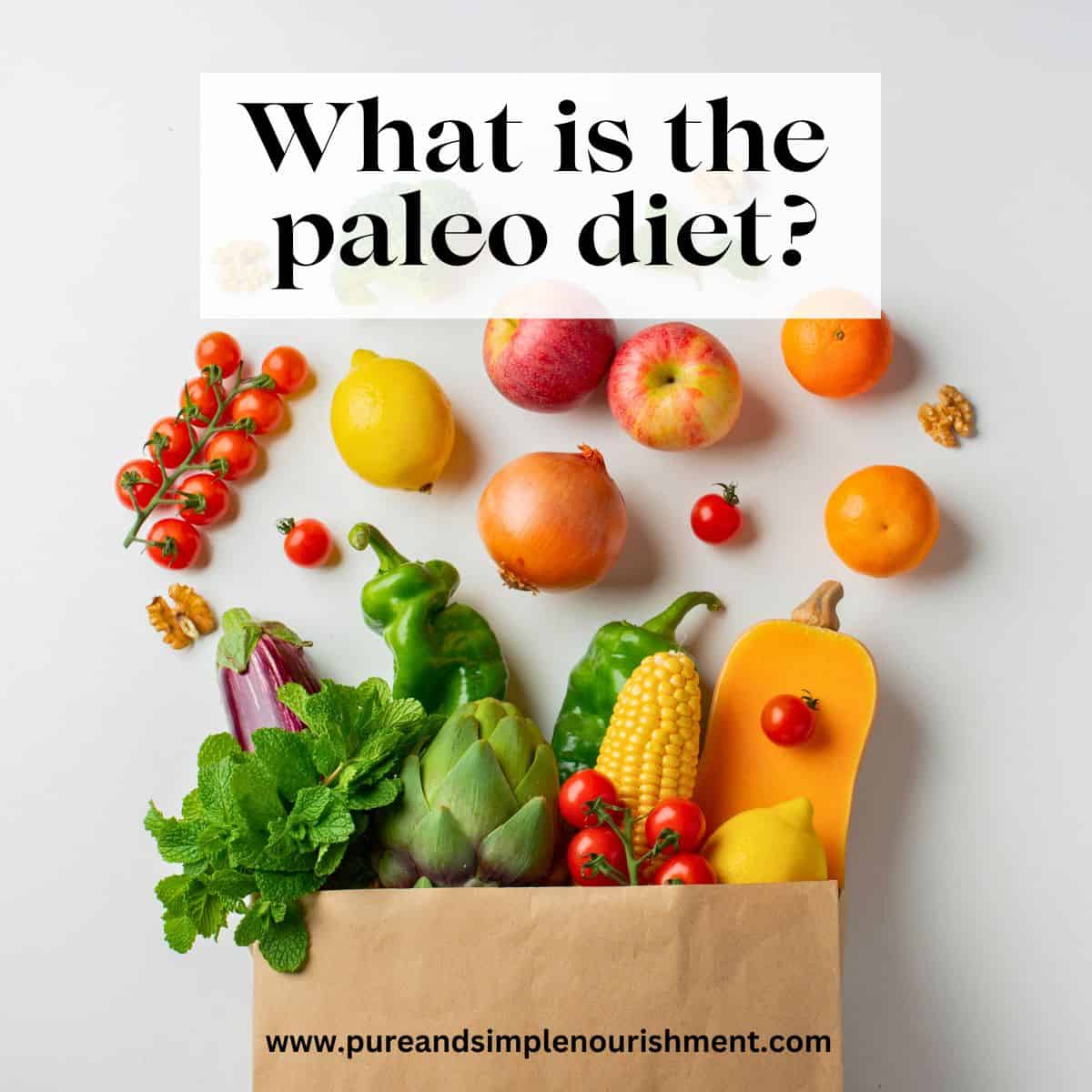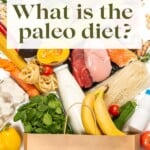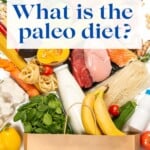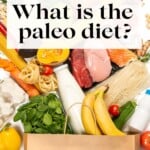What is the paleo diet? The paleo diet is also known as the caveman diet or paleolithic diet and it emulates the way our ancestors ate. This post will review what the paleo diet is, the foods you can eat on it, a sample meal plan, and the risks and benefits of it.

Disclaimer: some of the links in this post are affiliate links whereby I make a small commission if you purchase the product through that link. This does not cost you anything extra and helps me to keep this website running.
What is the paleo diet?
One of the most common questions that I get asked by my blog readers is "what is the paleo diet?". The paleo diet is the diet that helped me heal many of my own health issues including chronic diarrhea, vomiting, headaches, keratosis pilaris and acne so needless to say I am a huge fan of the paleo diet.
As someone who was on the paleo diet for over 10 years you would think I would have posted this earlier but I just never really thought about it. There are so many other amazing resources out there explaining the paleo diet that I thought it was obvious. However, I have found that there is a lot of misinformation online about what the paleo diet is, so I felt it important to write a post to help clear up any confusion on what the paleo diet is and isn't.
The paleo diet, also known as the paleolithic diet, caveman diet, hunter gatherer diet, or stone-age diet, is a way of eating that tries to emulate the way our ancestors ate. The idea is that the food we evolved on is the food that we are meant to eat and should still be trying to eat.
Unfortunately, our modern food system has completely changed the way we eat. Nutrient poor, ultra processed food has become the norm, and we are suffering many ill health effects as a result. Processed food intake has been linked to increased rates of cancer, heart disease, type 2 diabetes and many other health conditions.
Many chronic health issues are on the rise, and they are all conditions that basically did not exist when our ancestors were eating real, nourishing food. Now, I am not saying that what we eat explains all aspects of these health issues, but more and more evidence shows that it does play a role in many of them.
The paleo diet encourages you to eat real, whole, unprocessed, nourishing foods. It encourages you to eat fruits, vegetables, meat, nuts, and seeds and to avoid processed food and refined sugars.
The paleo diet has also been shown to be helpful for many different health conditions, including for weight loss, diabetes, and heart disease. There are also many anecdotal reports of it helping with chronic pain and digestive issues such as bloating, gas and constipation etc. For me personally the paleo diet helped me heal from chronic diarrhea and vomiting, skin rashes, headaches and acne.
I am going to break this post into a few different parts. In this post I will discuss the basis of the paleo diet and the principles of the paleo diet as well as common paleo diet myths, what foods are allowed and not allowed on the paleo diet and give you tips for succeeding on the paleo diet.
So, with that in mind, let's go over the principles of the paleo diet.
Table of Contents
- What is the paleo diet?
- Paleo diet principles:
- Foods allowed on the paleo diet
- Foods to avoid on the paleo diet:
- Paleo diet food list:
- Paleo diet risks and benefits:
- Paleo diet meal plan:
- Paleo snacks:
- Paleo diet resources:
- Paleo diet vs keto diet
- Paleo diet vs carnivore diet
- Frequently asked questions:
- Other information you will be interested in:
- Our expertise:
Paleo diet principles:
1. Eat whole nourishing foods and avoid processed foods
Food was meant to be eaten in its natural form. Processing and refining strips food of its nutrients including vitamins and minerals. Processed foods are known to contribute to many different health issues including weight gain, heart disease, cancer, diabetes and more.
This means eating whole fruits and vegetables, meat from animals raised in the traditional manner and raw seeds and nuts that have been properly prepared by soaking and sprouting before eating.
People are often surprised when I tell them that grains are a processed food. This is just one of the reasons why grains are not allowed on the paleo diet. I wrote an entire post on Why Grains Are Not Healthy which you may want to read to learn more.
2. Don't count calories
I know this goes against everything you've been taught. Especially if you are looking to lose weight. But food is so much more than its calorie content and counting calories often leads to restrictive eating patterns, which in the end is not sustainable and will just set you up to fail and gain more weight in the future.
Changing your diet also means changing your relationship with food. Food is not the enemy. You need food to survive, and to stay healthy. Start listening to your body. Eat when you are hungry, and stop when you are full. Don't try and multi-task when you are eating. Pay attention to your food and chew it thoroughly. As you start changing your relationship with food, and start eating nourishing, anti-inflammatory foods, you will have a much easier time regulating your weight, without having to stress yourself out about how many calories you are eating, and how you are going to get through the day while still feeling hungry and deprived.
As well, some of the most nutrient dense foods are also the ones with the most calories. Thus if you try to restrict your calories you may also be limiting your nutrients.
3. Eat foods that support digestive health
One of the biggest problems with the standard North American diet is its damaging effects on the digestive tract. Grains, food additives and other processed ingredients can all damage the intestinal tract. Normally your digestive tract is lined with cells that are tightly connected by cells called tight junctions. Unfortunately, these tight junctions can get damaged by proteins in grains and certain chemicals in processed food allowing the cells of the gut to become leaky.
Leaky gut syndrome (otherwise known as increased intestinal permeability) allows food particles, toxins, bacteria and other foreign particles that should remain in the gut to cross the gut barrier and thus enter the blood stream. This can lead to systemic inflammation, and in susceptible people, can contribute to the development of different chronic diseases, especially autoimmune diseases, as your body starts to attack these foreign particles. Every day more and more chronic diseases and autoimmune diseases such as inflammatory bowel disease, diabetes (types 1 and 2) and weight gain are being linked to leaky gut syndrome.
Besides avoiding foods that can be damaging to the intestinal lining, it's also important to eat foods that help support the intestinal lining and help promote a healthy gut microbiome. Fermented foods with probiotics are known to be great for digestive health. This includes foods like sauerkraut, kimchi, yogurt, kombucha etc. Fruit, vegetables, and foods high in fiber are also all great for gut health.
4. Eat anti-inflammatory foods
Another problem with the North American diet is how inflammatory it is. Many chronic health conditions, have been linked to increased inflammation in the body. A healthy, balanced diet should consist of roughly one to four times more omega-6 fatty acids than omega-3 fatty acids. The typical North American diet tends to contain 11 to 30 times more omega -6 fatty acids than omega -3, a trend that is believed to be a significant factor in the rising rate of inflammatory diseases.
Even foods that traditionally would not cause inflammation now can because of the processing that is used to make them. For example, cows raised on grass produce meat with an omega-6 to omega-3 ratio of 1-4:1. However, cows fed grains (as they are on most modern farms) produce meat with an omega- 6 to omega-3 ratio of 8-13:1. This excessive intake of omega-6 is believed to increase inflammation in the body and contribute to various health issues.
For example, several studies have established a connection between low levels of omega -3 fatty acid intake and depression. As well, high consumption of omega-3 fatty acids is also associated with a lower rate of depression, a decreased prevalence of age-related memory loss and a lower risk of developing Alzheimer's disease.
Thus by focusing on real, anti-inflammatory foods and foods prepared in traditional ways you can help increase your omega 3 intake and thus help decrease inflammation.
5. Limit your sugar intake
High sugar intake, especially of processed sugars, is linked to a multitude of health problems including obesity, diabetes, heart disease, liver disease etc. As such, one important principle of the paleo diet is to limit your sugar intake. Now, I am absolutely not saying that you can never eat dessert again, I fact you will find many paleo dessert recipes on this site, but at the end of the day sugar is sugar, and too much of it is not good for you. So, enjoy your paleo treats in moderation.
6. Eat what's right for you
If there is one thing I cannot emphasize enough is that when it comes to food, there is no one size fits all approach that works for everyone. The paleo diet is not a prescription, it is a way of eating. Everyone is unique, and the foods that allow one person to thrive can have devastating effects on someone else. That is why my number one rule is to listen to your body first. If a food does not agree with you, don't eat it. Even if it is known to be "healthy". For example, some of my patients with rheumatoid arthritis notice that their joints flare when they ingest nightshade vegetables. For these people avoiding nightshades makes sense, while for other people nightshades can be a very healthy part of the diet. Again, everyone is unique, so do what's best for you.
Foods allowed on the paleo diet
You can enjoy so many delicious foods when you are on the paleo diet. Here is a summary of the foods you can eat on this diet:
- Meat: Beef, lamb, chicken, turkey, pork, duck, etc. Any type of unprocessed meat is allowed on the paleo diet. Note that sugar free and nitrate free bacon is also allowed.
- Fish and seafood: salmon, trout, scallops, tuna, haddock, shrimp, shellfish, etc (choose wild-caught if you can).
- Eggs: free-range or pasture raised are preferred if possible.
- Vegetables: All types of vegetables are allowed to be eaten on the paleo diet.
- Fruits: All types of fruit are allowed on the paleo diet. Dried fruits without added sugar are also allowed. Fruit juice made from pure fruit is also allowed.
- Tubers: potatoes, sweet potatoes, yams, turnips, etc.
- Nuts and seeds: almonds, macadamia nuts, walnuts, hazelnuts, sunflower seeds, pumpkin seeds, and more. Just be sure to choose raw nuts rather than pre-roasted nuts.
- Healthy fats and oils: extra virgin olive oil, avocado oil, coconut oil, butter, ghee and others.
- Spices: all types of spices can be eaten on the paleo diet as long as they are sugar free and unprocessed.
- Sweeteners: unprocessed sweeteners including honey, maple syrup, date syrup and coconut sugar are allowed on the paleo diet.
- Drinks: water, tea, coffee, kombucha, other fermented drinks.
- Grain free flours: almond flour, coconut flour, tapioca flour, arrowroot flour, potato flour etc.
- Baking ingredients: baking soda, cocoa powder, cacao powder, shredded coconut, coconut flakes.
- Condiments: some condiments are allowed on the paleo diet but be sure to read labels carefully to make sure the ingredients are safe.
- Non dairy yogurt such as coconut yogurt (just be sure there are no refined sugars, additives or sweeteners in it).
It is preferred to choose pasture raised and grass fed meat while on the paleo diet, however this is not mandatory as these cuts of meat can be harder to find and more expensive.
Foods to avoid on the paleo diet:
Here is a list of foods that are not allowed on the paleo diet:
- Refined sugars and sweeteners: This includes ingredients like white sugar, brown sugar, corn syrup etc. This also means that foods and drinks made with these sugars such as things like soft drinks, candy, pastries, ice cream, etc will also need to be avoided.
- Grains: This includes all grains such as wheat, barley, oats, corn, quinoa, rice spelt, rye, barley, etc. - if you are curious to learn more I have a whole post on why corn is not paleo.
- Beans and lentils
- Soy
- Dairy: all types of dairy are to be avoided. Ghee is the only general exception.
- Crop oils (also known as vegetable oils): soybean oil, sunflower oil, cottonseed oil, corn oil, grape seed oil, safflower oil, canola oil etc.
- Artificial sweeteners: aspartame, sucralose, cyclamates, saccharin, acesulfame potassium (use natural sweeteners instead)
- Highly processed foods
- White potatoes: note that when the paleo diet was initially described white potatoes weren't allowed, but once the Whole30 program started allowing white potatoes many other paleo advocates changed their mind about potatoes. Again, do what works best for your body.
- Peanuts
Paleo diet food list:
For an even more complete list of foods that are allowed and not allowed on the paleo diet please download my free paleo food list pdf below:
Paleo diet risks and benefits:
As mentioned earlier studies have shown that there can be many benefits of a paleo diet including weight loss, reduction in diabetes, improved cholesterol levels, and reduction in heart disease.
However, there are some potential risks to the paleo diet that you should be aware of.
The paleo diet does restrict a number of food groups including grains, beans, lentils and dairy, and for people who have eating disorders or struggle with restrictive eating patterns, this could trigger those patterns even more.
As well, beans, lentils and grains are the primary sources of protein in vegan and vegetarian diets, which makes the paleo diet unreasonable for anyone on a vegan or vegetarian diet.
The paleo diet could lead to diarrhea or other GI upset for some people. The diet is high in insoluble fiber, which can have a laxative effect in people not used to eating high amounts of insoluble fiber. In fact, one study did report diarrhea in a number of participants.
Paleo diet meal plan:
This is a sample paleo diet 7 day meal plan. And if you are looking for more delicious paleo recipes I have hundreds of them on this site!
Day 1
- Breakfast: scrambled eggs and vegetables fried in avocado oil with a side of fresh fruit.
- Lunch: a large salad with chicken, nuts, the vegetables of your choice and a homemade salad dressing
- Dinner: Paleo sloppy joes with a kale with apple salad.
Day 2
- Breakfast: paleo banana muffins with sausages and a side of fruit.
- Lunch: leftover sloppy joes from the night before.
- Dinner: blackened Mahi Mahi fish with roasted vegetables.
Day 3
- Breakfast: sausages with hard boiled eggs.
- Lunch: leftover fish from the night before with Asian coleslaw salad.
- Dinner: paleo teriyaki chicken and broccoli served over cauliflower rice.
Day 4
- Breakfast: cherry cheesecake smoothie.
- Lunch: leftover teriyaki chicken from the night before with fresh fruit.
- Dinner: juicy paleo burgers served in a lettuce bun with a side of roasted sweet potatoes.
Day 5
- Breakfast: paleo blueberry pancakes with a side of bacon.
- Lunch: leftover burgers from the night before with paleo broccoli salad.
- Dinner: Ground pork chili served with paleo cornbread.
Day 6
- Breakfast: paleo chocolate chip banana bread with almond butter and a side of fresh fruit.
- Lunch: leftover chili from the night before with a salad.
- Dinner: salmon cakes in the air fryer served over a salad.
Day 7
- Breakfast: grain free granola served over coconut yogurt with fresh berries.
- Lunch: leftover salmon cakes served with cauliflower fried rice.
- Dinner: honey lemon pepper chicken wings served with mango and habanero salsa.
As you can see from the meal plan, the paleo diet doesn't need to feel restrictive or boring at all!
Paleo snacks:
Here are some ideas for simple paleo snacks:
- Raw nuts
- Fresh fruit
- Chocolate covered pecans
- Almond flour biscuits served with sugar free jam
- Raw veggies with dairy free carrot dip
- Hard boiled eggs
- Bacon
- Meat jerky
- Ants on a log made with almond butter instead of peanut butter
- Apple slices with cashew butter or another nut or seed butter
- Raspberry chia pudding
- Honey dijon pecans
Paleo diet resources:
If you are looking for some great resources or further reading on the paleo diet, my favourite books on the topic are:
And if you are thinking about starting the paleo diet, I have some great advice in my paleo diet tips post to help get you started.
Paleo diet vs keto diet
Many people confuse the paleo diet and the keto diet, but they are actually quite different. The goal of the keto diet is to significantly limit your carbohydrate intake to put your body into ketosis. Because of that, when you are on the keto diet you will need to keep track of your carbs and and net carbs and keep them below a certain level. You will have to limit your intake of foods like starchy vegetables, fruits and natural sugars in order to hit those carbohydrate targets.
In contrast the paleo diet allows you to eat fruit, natural sugars and vegetables including starchy vegetables. When you are on the paleo diet you do not need to count carbohydrates, calories or macros.
As well, the keto diet encourages dairy intake, while the paleo diet eliminates dairy. The keto diet also allows processed sugar free sweeteners while the paleo diet asks you to avoid processed sweeteners.
Paleo diet vs carnivore diet
The carnivore diet has gained popularity recently and some people confuse it with the paleo diet but the two are quite different. The carnivore diet only allows you to eat food that comes from animals and restricts all intake of food from plants such as fruits and vegetables. In contrast, the paleo diet allows you to eat foods from animals as well as food from plants.
Frequently asked questions:
No, oats are not permitted on the paleo diet as the paleo diet restricts all grains.
Yes. All types of fruit are permitted on the paleo diet.
Yes. All fruits and vegetables are allowed. However, if you are following the autoimmune paleo diet (AIP) nightshades, including tomatoes are not allowed, at least initially.
This one is controversial. Some people say yes, others say no. We know that too much alcohol is not healthy and the latest guidelines on alcohol recommend drinking 2 drinks per week at most, so my recommendation is that if you are going to drink alcohol do so in very limited amounts.
Other information you will be interested in:
- Carnivore diet snacks
- How to soak and dehydrate nuts and seeds
- The best non-toxic sunscreens
- The best alternatives to rice
Our expertise:
Dr. Erin Carter, MD, FRCPC, is a physician with board certifications in internal medicine and rheumatology. She is passionate about preventative healthcare including nutrition, environmental health and low toxicity living. She is also a self-trained chef and has been creating and publishing healthy recipes since 2015. Her recipes have been featured on many different websites and online publications.




eeda
is it ok to eat rice ?
Erin Carter
Rice is not allowed on the paleo diet no. But of course do what's best for your body!
eeda
is it ok to eat corn?
Erin Carter
Corn is not allowed on the paleo diet no. No grains are allowed. But of course do what's best for your body! If you do choose to eat corn though make sure you are getting non GMO.